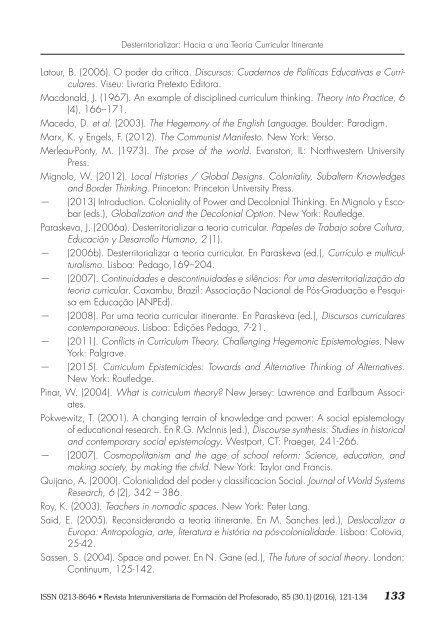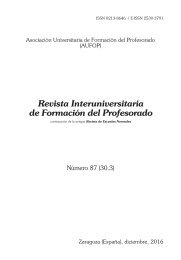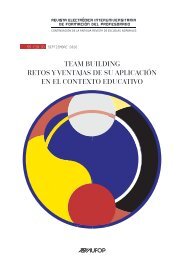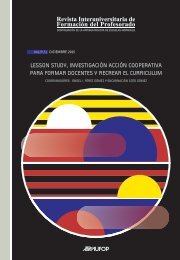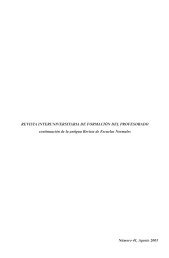SU IMPORTANCIA Y SU SENTIDO
SZ1QUjWc
SZ1QUjWc
You also want an ePaper? Increase the reach of your titles
YUMPU automatically turns print PDFs into web optimized ePapers that Google loves.
Desterritorializar: Hacia a una Teoría Curricular Itinerante<br />
Latour, B. (2006). O poder da crítica. Discursos: Cuadernos de Políticas Educativas e Curriculares.<br />
Viseu: Livraria Pretexto Editora.<br />
Macdonald, J. (1967). An example of disciplined curriculum thinking. Theory into Practice, 6<br />
(4), 166–171.<br />
Macedo, D. et al. (2003). The Hegemony of the English Language. Boulder: Paradigm.<br />
Marx, K. y Engels, F. (2012). The Communist Manifesto. New York: Verso.<br />
Merleau-Ponty, M. (1973). The prose of the world. Evanston, IL: Northwestern University<br />
Press.<br />
Mignolo, W. (2012). Local Histories / Global Designs. Coloniality, Subaltern Knowledges<br />
and Border Thinking. Princeton: Princeton University Press.<br />
— (2013) Introduction. Coloniality of Power and Decolonial Thinking. En Mignolo y Escobar<br />
(eds.), Globalization and the Decolonial Option. New York: Routledge.<br />
Paraskeva, J. (2006a). Desterritorializar a teoria curricular. Papeles de Trabajo sobre Cultura,<br />
Educación y Desarrollo Humano, 2 (1).<br />
— (2006b). Desterritorializar a teoria curricular. En Paraskeva (ed.), Currículo e multiculturalismo.<br />
Lisboa: Pedago,169–204.<br />
— (2007). Continuidades e descontinuidades e silêncios: Por uma desterritorialização da<br />
teoria curricular. Caxambu, Brazil: Associação Nacional de Pós-Graduação e Pesquisa<br />
em Educação (ANPEd).<br />
— (2008). Por uma teoria curricular itinerante. En Paraskeva (ed.), Discursos curriculares<br />
contemporaneous. Lisboa: Edições Pedago, 7-21.<br />
— (2011). Conflicts in Curriculum Theory. Challenging Hegemonic Epistemologies. New<br />
York: Palgrave.<br />
— (2015). Curriculum Epistemicides: Towards and Alternative Thinking of Alternatives.<br />
New York: Routledge.<br />
Pinar, W. (2004). What is curriculum theory? New Jersey: Lawrence and Earlbaum Associates.<br />
Pokwewitz, T. (2001). A changing terrain of knowledge and power: A social epistemology<br />
of educational research. En R.G. McInnis (ed.), Discourse synthesis: Studies in historical<br />
and contemporary social epistemology. Westport, CT: Praeger, 241-266.<br />
— (2007). Cosmopolitanism and the age of school reform: Science, education, and<br />
making society, by making the child. New York: Taylor and Francis.<br />
Quijano, A. (2000). Colonialidad del poder y classificacion Social. Journal of World Systems<br />
Research, 6 (2), 342 – 386.<br />
Roy, K. (2003). Teachers in nomadic spaces. New York: Peter Lang.<br />
Said, E. (2005). Reconsiderando a teoria itinerante. En M. Sanches (ed.), Deslocalizar a<br />
Europa: Antropologia, arte, literatura e história na pós-colonialidade. Lisboa: Cotovia,<br />
25-42.<br />
Sassen, S. (2004). Space and power. En N. Gane (ed.), The future of social theory. London:<br />
Continuum, 125-142.<br />
ISSN 0213-8646 • Revista Interuniversitaria de Formación del Profesorado, 85 (30.1) (2016), 121-134 133


